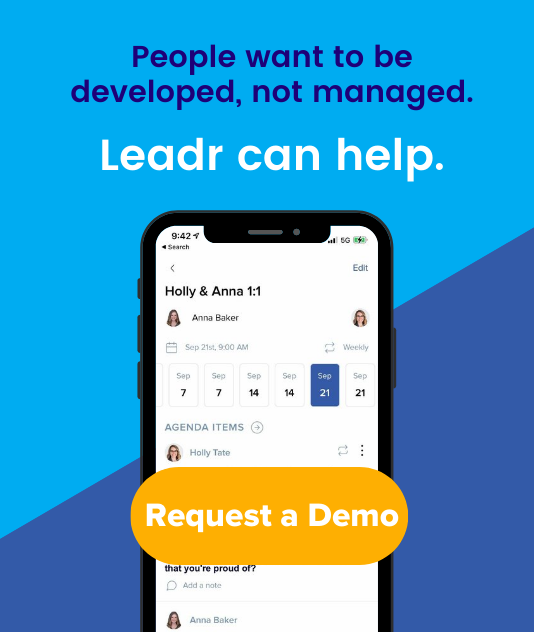Three Simple Strategies to Raising Up New Leaders On Your Team
Leadership development may be one of the most important everyday tasks you face as a manager.
You might be thinking, wait a second - every day? And yes, we mean every day. We mean that leadership development is so key to the success of your team that it should be a regular part of your day. Add it to the top of your daily to-do list, even! Your team always needs quality leaders, and you should always be on the lookout for ways you can encourage and foster opportunities for others to discover and explore where they are natural leaders, and then let them shine.
The good news is - there are so many ways to build this into your regular team rhythms.
The other good news is - a lot of times, you don’t even have to hire someone new when the opportunity or need for a new leadership position opens. Hiring is time-consuming and expensive and you don’t have the built-in benefit of knowing someone’s personality or “culture fit” with a new hire.
Maybe the right person is on your team already - perhaps they are not “in the right seat on the bus” or they are ready to grow into a role that requires more accountability or responsibility. Or maybe they are in a position to take something off your or someone else’s plate that allows them ways to lead their peers and self-evaluate their progress in certain skills.
Here are three ways to build development into your everyday rhythms that will help you raise up leaders from within your team:
It begins with culture.
A culture of ownership is key to flourishing on your team, but it also opens the door for conversations about leadership with those you are developing, almost seamlessly! When your team is not just proud of what they are creating, but able to give and receive regular feedback, they are also more invested in growth when something goes wrong - or right. A healthy feedback loop reinforces to your team that everything can lead to better outcomes: something went wrong or a mistake was made? We can ask ourselves, “how can we do this differently next time?” Instead of dwelling on the negative. If something is a win, we can ask, how can we keep doing that, or make it even better?
This team ownership creates buy-in - each person is excited and invested equally in the process as encouragement and spot praise are given liberally, and no one feels ostracized or shameful when something goes wrong.
For someone that you are working with on leadership development, these opportunities create candid learning moments - how did a seasoned leader handle this issue? Can they observe how a team member responds well to praise in the moment and how that changes the dynamic of the team? Being able to watch and then talk through these things with a developing leader is key to them applying those practices on their own. It also reinforces their own investment and value to the team. They know their manager is on their side and wants them to grow, so it’s a safe place to learn.
Find the opportunities right where you are.
One of the best things about consistent leadership development on your team is that you eliminate the stress that comes with hiring and focus instead on already developed opportunities. As someone’s manager, you likely already know their strengths and weaknesses. So you probably can see clearer than most where they would be great at leading on their own. Start with small things - maybe they can have an intern shadow them and they teach the intern how to do one of their processes, and you take a moment during your regular one-on-one meeting to talk through how that went.
Or maybe you are needing to adjust the workload, and someone with a gift for art can take on more responsibility overseeing a junior graphic designer. The possibilities are endless and again, the one-on-one meeting you have regularly provides great opportunities for you to ask about someone’s interests and passions, and to highlight their strengths and the value they bring to the team, which is a win for everyone.
Another key thing to note is that looking for an opportunity to develop someone can also be an effective way of navigating what were once issues or trouble spots on your team. Sometimes a team member might truly be in the right organization but in the wrong role and struggling with an aspect of their job. Looking for ways to develop them, rather than struggling through frustrating interactions or dropped balls that ultimately lead to either burnout or turnover, you’re focusing on the person. Who is this person to the organization, and how can I help them win? Not only will this help you discover the right place for them, but if it doesn’t work out (which happens), the conversation is still heard through a lens of dignity and value.
Note: If you’re really struggling with a team member, we’ve got you covered. Check out our guide to the new way of conducting Performance Improvement Plans (PiPs).
You’re in the business of people management, not project management.
As a leader, your first focus should be people - not projects. You’ll most likely encounter more people challenges and learning moments as a leader in this area than you will doing anything else. As a leader, it’s an honor to encourage people in finding their calling. Whether that’s something someone did that was going above and beyond, reflecting with them on how far they’ve come, or simply celebrating with them as they lean into what truly fuels them, there is nothing more rewarding for a manager or honoring for an employee to call out the good in others.
In these moments, find ways to connect others with resources and people who help them win too. Maybe you start reading a book with one of your team members that you discuss during one-on-ones or “assign” them a project like getting a certification or attending a class or conference or skillshare.
In the Leadr software, we have a growth track where you can personalize and tailor activities to each team member that gives them tangible steps towards leadership development.
These things take time and consistency, but the payoff is huge. You never know, you may play a role in helping them figure out how to start on a life-changing path. We’d love to hear from you. How can you take one small step this week to begin developing leaders within your organization?
Want to see how Leadr can help? Request a demo here. 
Share this
You May Also Like
These Related Stories

5 Ways Using Personality Insights Make you a Better Leader

Your Team’s Not Just There to Work. They’re There to Grow.





No Comments Yet
Let us know what you think